|
Ahmad Chalabi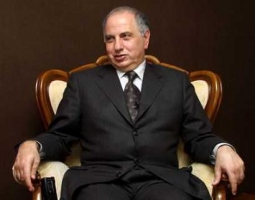 You would be hard pressed to find a single person in Washington D.C. who didn't have some opinion about Ahmad Chalabi.
You would be hard pressed to find a single person in Washington D.C. who didn't have some opinion about Ahmad Chalabi. However, you would also be hard pressed to find two people who have the same opinion. And if by chance you did, their names would almost certainly be Dick Cheney and Paul Wolfowitz. Depending on who you talk to (and when you talked to them), the Iraqi "freedom fighter" is either the savior of Iraq or the world's biggest con-man, or both, depending on your world-view. Chalabi is a member of Iraq's Shi'ite Muslim majority. His family was wealthy and socially superior until the Ba'athists took control of the country. While Iraq was still a monarchy, Chalabi's family provided services for the royal family, and collected influence in return (much like the bin Laden family in Saudi Arabia). Under Saddam Hussein, Chalabi's family was disenfranchised, but Ahmad himself was long gone by then, having moved out in 1956. He didn't move back until 2003, and he barely set foot in the country at all in the intervening years. (Strange credentials to become an administration's preeminent consulting expert on Iraq, but we'll get to that.) Educated early on in Britain, Chalabi became a British citizen. He studied math at M.I.T. and later at the University of Chicago. He taught math in Beirut for a while, then moved to Jordan to help institute the Petra Bank there, which catered to a mostly Palestinian clientele.
Chalabi claimed the charges were trumped up to persecute him for opposing Saddam. Chalabi had been a vocal (but apparently passive) opponent of the Hussein regime. Chalabi's nationalistic fervor was mostly self-concerned: He wanted his father's land and wealth back. As Bob Baer, the CIA's case officer in Iraq in the mid-1990s, explained in his book See No Evil: Outside Iraq, Chalabi was a felon; inside, he remained almost completely unknown. But what he lacked by way of credentials, he made up for in brains, energy and a practiced political touch. ... For a guy with virtually no internal support in Iraq, Chalabi knew how to get things done...Chalabi's main channel into Iraq was a small council of exiles known as the Iraqi National Congress, created by the U.S. government as the "official" opposition group to the regime of Saddam Hussein. Saddam wasn't exactly shaking in his boots. A spokesman for the former regime once told NBC's Tom Brokaw: You guys can have Chalabi! You can keep feeding him all the prime rib and expensive Scotch. He doesn't know anyone here. He hasn't been to Iraq in 25 years. 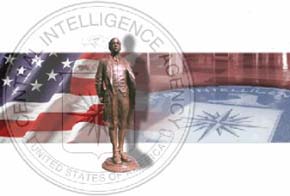 The INC was widely considered a joke, but it had money and it had Chalabi, a fair to competent schemer. Indeed, he was the kind of guy you would want to have on your side... if you could be sure he was in fact on your side. Which you couldn't.
The INC was widely considered a joke, but it had money and it had Chalabi, a fair to competent schemer. Indeed, he was the kind of guy you would want to have on your side... if you could be sure he was in fact on your side. Which you couldn't. Case in point: Chalabi collaborated with the CIA in an attempt to stage an uprising against Saddam Hussein in March 1995. The attempt was an utter debacle. Armed with assurances that the U.S. government would support the coup, Chalabi teamed up with a loose coalition of resistance fighters and the Kurds, an oppressed ethnic group in the north of Iraq. The coup turned into one of those convoluted fiascoes that has become a familiar story in recent years. Shortly before the uprising was scheduled to occur, Chalabi met with Iranian intelligence agents in order to enlist Iran's support, or at least its non-interference. In order to convince the Iranians that the U.S. was fully behind the operation, Chalabi "accidentally" left a memo on his desk outlining a CIA-approved attempt to assassinate Saddam Hussein. The Iranians "accidentally" saw the memo, and quite deliberately sent a message back to Tehran. The coded message was intercepted by U.S. intelligence services and sent to the White House, which believed Baer had gone rogue and approved the plan. As a result, the White House pulled its support for the uprising at the very last minute, leaving the revolutionaries to be crushed by Saddam. Chalabi fled the country. Baer was called back to Washington and investigated at length, effectively ending his career. The incident was remembered inside the Agency as the "Bay of Goats." According to Baer, Chalabi forged the letter at the heart of all this hubbub -- a reasonably credible claim, all things considered. Nevertheless, Newsweek recently reported that some U.S. officials still believe Baer was really gunning for Saddam. But then the last few years have proved nothing if not that some U.S. officials will believe just about anything, if it's convenient.
There's still some dispute about exactly when Bush Jr. decided to invade Iraq, but most estimates say that the decision was made some time between the exact moment he decided to run for president in the first place and Sept. 12, 2001. After al Qaeda launched its attack on the U.S. by crashing commercial jets into the World Trade Center and the Pentagon, Americans were quite naturally looking for someone to blame. As the experts turned their attention to the problem, the culprit quickly became clear: Osama bin Laden. Well, clear to some people anyway. While CIA director George Tenet looked to Afghanistan, Donald Rumsfeld was looking to Iraq. The reason? Because it was easier to find things to bomb in Iraq. Some reports said that Chalabi took part in meetings with pro-war hawks just outside the administration to discuss pretexts for invading Iraq within days of the 9/11 attacks. In a sane world, Rumsfeld's comments to this effect might have simply been ignored while the grown-ups went to deal with the situation at hand. But Vice President Dick Cheney and Rumsfeld's top deputy Paul Wolfowitz had massive hard-ons for Saddam Hussein. Both men were students of the conspiracy theories propounded by former Defense Department evildoer Richard Perle and Laurie Mylroie, an academic who argued unconvincingly that Saddam had been behind the 1993 World Trade Center bombing and the Oklahoma City bombing, and possibly the Holocaust, the Gunpowder Plot and the Inquisition as well. So even as the force of common sense and public opinion moved the U.S. slowly but surely toward bin Laden's Afghanistan hideout, the Pentagon was dusting off Ahmad Chalabi for one more mission. This time, there would be no mistakes, no last minute reversals. Saddam was going down, and Chalabi was going along for the ride.
Obligingly, Chalabi produced a few defectors who testified that Iraq was dangerously close to getting its hands on weapons of mass destruction. In fact, while the investigations are far from complete, it increasingly appears that quite a lot of the pre-war intelligence about Iraqi WMDs came from Chalabi. In a post-invasion interview with Frontline, Chalabi outlined some of the helpful information he provided to the U.S. We provided exactly three defectors on the weapons of mass destruction to the United States. The first one was an engineer who was involved in building sites for weapon storage and development. ... The second fellow -- Harith. ... He gave them information about mobile biological weapons labs. ... The third one is a young man who is with us here, still, who told them about an isotope separation facility that he was working on. They didn't want to talk to him.Chalabi also provided information, including some of the informants cited above, to the New York Times, which uncritically published the claims of the first informant, helping fuel public sentiment in favor of the war. Two years later, the Times published a half-hearted correction. Another defector "discovered" by Chalabi claimed Saddam had let terrorists do practice runs in hijacking on a grounded aircraft near Baghdad. The CIA dismissed the claim as "bullshit." Undeterred, Chalabi assured Cheney and Rumsfeld that the Iraqi people would "welcome us as liberators," in Cheney's words. Chalabi said that Iraqis would gratefully strew flowers and candy before U.S. soldiers. The CIA had already been burned by Chalabi and kept its distance. The interaction with Chalabi went through the Pentagon this time. The Defense Department had Chalabi airlifted into Iraq just before U.S. forces stormed Baghdad, on the theory that he would provide a rallying point for the Iraqis. Unfortunately, none of Chalabi's boasts, claims, reassurances or intelligence tips have turned out to be particularly true. Too bad there weren't any prior warnings about Chalabi's reliability, like a history of fraud, theft, manipulation, forgery or his tendency to rat Americans out to Iran!
But his moment of glory was fleeting. Paul Bremer, the administrator of the U.S.-dominated Coalition Provisional Authority, is believed to have soured on Chalabi as time passed, perhaps in light of the growing weight of scandal surrounding the man. Chalabi and Bremer battled it out over Bremer's decision to bring in outside auditors to evaluate the financial management of the CPA, a story that has (as of yet) received little of the spotlight. Whispered charges and anonymously sourced news stories abound concerning shady dealings between Chalabi and the U.S. oil companies currently pillaging Iraq's oil fields. Chalabi complained that the charges against him had been trumped up by the CIA, his mortal enemy. But apparently Bremer was unconvinced. In May 2004, U.S. troops and Iraqi policemen stormed Chalabi's home in Iraq, looking for evidence. The move blindsided Chalabi, and may have also blindsided his patrons back home. After hours passed, the CPA finally issued a terse statement that the Iraqis had issued a warrant for the raid, and that no further information was forthcoming. According to Newsweek, the civilian control freaks running the Pentagon were caught completely off guard by this development, horrified to discover that their own soldiers had been used to persecute their good friend Ahmad:
[T]he raid came as a surprise. Secretary of Defense Donald Rumsfeld and his senior deputies, Paul Wolfowitz and [the Pentagon's No. 3 civilian] Douglas Feith, got the news from the media. When Iraqi police, guarded by American GIs, burst into the home and offices of Ahmad Chalabi and his Iraqi National Congress, looking for evidence of kidnapping, embezzlement, torture and theft, the men who run the Pentagon were left asking some uncomfortable questions. "Who signed off on this raid?" wondered one very high-ranking official. "What were U.S. soldiers doing there?" asked another, according to a source who was present in the room.It appears (as of this writing) that the raid had been OK'ed by Bremer, possibly with the approval of someone at the White House. Slowly, reports began to trickle out about the reason why. According to unnamed "intelligence sources," who had started spilling their guts to every U.S. news organization inside the Beltway, Chalabi had jumped back into bed with his friends in Iran, tipping Iranian intelligence off to the fact that U.S. intelligence had cracked their ultrasecret cryptography. Chalabi reportedly told Iranian intelligence he had heard the information from a drunken American. Despite this fun tipoff, the Iranians were apparently not feeling especially charitable. The operatives wired the news back to Tehran -- specifically naming Chalabi and using the exact codes Chalabi had just told them were broken. Even a paranoid has enemies, and that last bit did seem to be either pointlessly cruel or unforgivably careless. Either way, Chalabi mounted an aggressive defense, playing the martyr and loudly protesting that he had been framed unjustly.
Aside from the possibility that the CIA might genuinely have set Chalabi up, there are dozens of reasons why Tenet wouldn't have wanted to touch this investigation with a 99 1/2 foot pole. For instance, there's the close ties to the Vice President and the Secretary of Defense. There's the fact that this is an election year. There's the former CIA fiasco with the coup back in 1995, and the subsequent investigation that might come out in uncomfortable detail. Then there were the meetings President Bush had with Chalabi. What meetings, you ask? The president said in early June 2004:
My meetings with him were very brief. I mean, I think I met with him at the State of the Union and just kind of working through the rope line, and he might have come with a group of leaders. But I haven't had any extensive conversations with him.What's fishy about that statement is not so much the statement itself as the reporter's question it was answering: "I'm wondering if you feel that [Chalabi] provided any false information, or are you particularly..." Bush was never asked if he met with Chalabi, and no one has reported that he had. So what was discussed at these meetings, and when were they held? And so on, and so on, and so on...
[Tenet] was behind the charges against me that claimed that I gave intelligence information to Iran. I denied these charges, and I will deny them again. ... [Tenet provided] erroneous information about weapons of mass destruction to President Bush, which caused the government much embarrassment at the United Nations and his own country.Which again shows you that Ahmad Chalabi is one smart operator. You see, Tenet can't say anything about these matters in public because, by law, a departing CIA director agrees to a million restrictions on what he can disclose, including that the White House has total veto power over his ability to discuss nearly any detail of his life. Chalabi also knows to quit when he's ahead. After the raid, he made it clear that he had pretty much soaked the United States for everything he wanted and then some. His loyalties now lie with the Iraqi people, specifically with the Shi'ite faction seeking to wrest control of the country away from the Americans. As far as we're concerned we've been entirely successful. That tyrant Saddam is gone and the Americans are in Baghdad. What was said before is not important. The Bush administration is looking for a scapegoat. We're ready to fall on our swords if he wants.As Chalabi told PBS, in reference to U.S. infighting over his role in the new Iraq, "These are American fights. They have little relevance here in Baghdad now."
Timeline
|
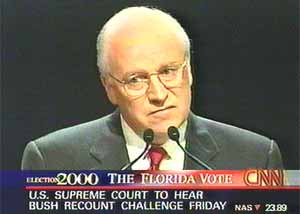 Chalabi became insanely rich working at the bank, and he was the toast of Jordanian society... right up until the government charged him with dozens of counts of embezzlement, fraud, forgery and theft. He fled the country in 1989. An independent audit found about $160 million had gone missing from the bank's accounts.
Chalabi became insanely rich working at the bank, and he was the toast of Jordanian society... right up until the government charged him with dozens of counts of embezzlement, fraud, forgery and theft. He fled the country in 1989. An independent audit found about $160 million had gone missing from the bank's accounts. 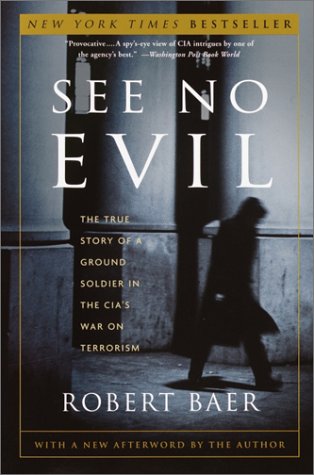 Either way, the incident was an embarrassing disaster, and it led the CIA to cut off its own funding and goodwill toward Chalabi around the end of the
Either way, the incident was an embarrassing disaster, and it led the CIA to cut off its own funding and goodwill toward Chalabi around the end of the 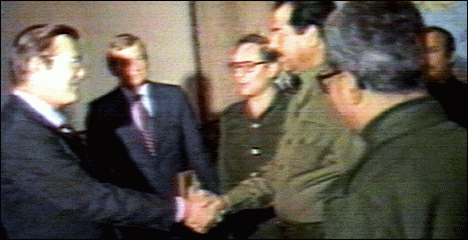 Chalabi had been sucking up to Cheney ever since the Republicans took back the Oval Office, so it didn't take a lot of arm twisting to get the Iraqi National Congress back in business. One of Chalabi's first jobs for the Bush team was to come up with evidence to justify the invasion in the first place.
Chalabi had been sucking up to Cheney ever since the Republicans took back the Oval Office, so it didn't take a lot of arm twisting to get the Iraqi National Congress back in business. One of Chalabi's first jobs for the Bush team was to come up with evidence to justify the invasion in the first place. 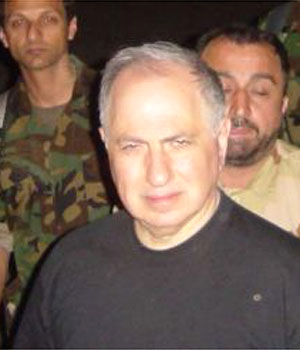 After the U.S. knocked Saddam off his high horse, Chalabi moved in to try to consolidate a position for himself, all the while protesting that he was only thinking of the Iraqi people. The State Department and the CIA tried to obstruct Chalabi's designs on post-war Iraq from Washington. But the Pentagon and the oil companies, working hand-in-hand on the ground in Iraq, continued to work with the wheeler-dealer. Chalabi had gone out of his way to curry favor with U.S. oil companies prior to the war. When the provisional government was put into place, Chalabi had a place at the table.
After the U.S. knocked Saddam off his high horse, Chalabi moved in to try to consolidate a position for himself, all the while protesting that he was only thinking of the Iraqi people. The State Department and the CIA tried to obstruct Chalabi's designs on post-war Iraq from Washington. But the Pentagon and the oil companies, working hand-in-hand on the ground in Iraq, continued to work with the wheeler-dealer. Chalabi had gone out of his way to curry favor with U.S. oil companies prior to the war. When the provisional government was put into place, Chalabi had a place at the table. 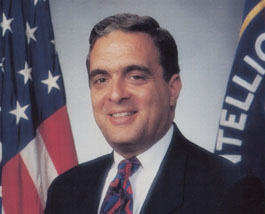 The truth is still unfolding. But it was only one week later that CIA chief George Tenet, one possible candidate as a talkative "unnamed intelligence source," abruptly tendered his resignation to President Bush... just hours after National Security Director
The truth is still unfolding. But it was only one week later that CIA chief George Tenet, one possible candidate as a talkative "unnamed intelligence source," abruptly tendered his resignation to President Bush... just hours after National Security Director 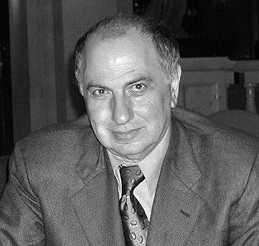 Whether Tenet resigned directly over the Chalabi mess or not, Chalabi wasted no time burying Tenet. Within hours of the public announcement of the resignation, Ahmad hit the airwaves to give his side of a story which had not, until that moment, seemed to concern him. Not only did he blame Tenet for persecuting him, but he also sought to shift the blame for the bad WMD intelligence onto the departing CIA director:
Whether Tenet resigned directly over the Chalabi mess or not, Chalabi wasted no time burying Tenet. Within hours of the public announcement of the resignation, Ahmad hit the airwaves to give his side of a story which had not, until that moment, seemed to concern him. Not only did he blame Tenet for persecuting him, but he also sought to shift the blame for the bad WMD intelligence onto the departing CIA director: